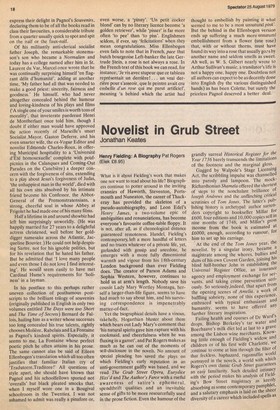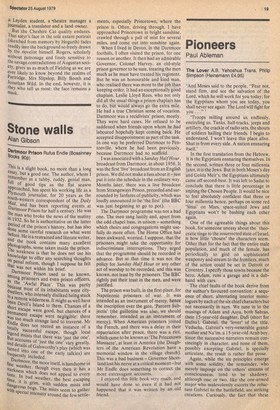Novelist in Grub Street
Jonathan Keates
Henry Fielding: A Biography Pat Rogers (Elek £8.95)
What is it about Fielding's work that makes one not want to read about his life? Biographers continue to potter around in the inviting crannies of Haworth, Steventon, Portsmouth and Nuneaton, the career of Thackeray has provided the skeleton of a pseudo-autobiography, and Leon Edel's Henry James, a two-volume epic of ambiguities and renunciations, has become everyone's favourite coffee-table floppy. It is not, after all, as if chronological distance guaranteed remoteness. Handel, Fielding's contemporary, left a mere handful of letters and no traces whatever of a private life, yet, garlanded with gossip and anecdote, he emerges with a more fully dimensional warmth and vigour from his 18th-century London background than ever Fielding does. The creator of Parson Adams and Sophia Western, however, continues to hold us at arm's length. Nobody save his cousin Lady Mary Wortley Montagu, herself a larger-than-life figure, seems to have had much to say about him, and his surviving correspondence is impenetrably matter-of-fact.
Yet the biographical details have a vinous, rakehelly, Hogarthian bluster about them which bears out Lady Mary's comment that 'his natural spirits gave him rapture with his cookmaid, and cheerfulness when he was fluxing in a garret', and Pat Rogers makes as much as he can out of the moments of sell-disclosure in the novels. No amount of special pleading has saved the plays on which Fielding's early reputation as an anti-government gadfly was based, and we read The Grub Street Opera, Eurydice Hiss'd and The Author's Farce with a rueful awareness of satire's ephemeral, spendthrift qualities and an inevitable sense of gifts to be more resourcefully used in the prose fiction. Even the humour of the grandly surreal Historical Register for the Year 1736 barely transcends the limitations of the footnote and the marginal gloss. Gagged by Walpole's Stage Licensing Act, the scribbling impulse was channelled into parody and lampoon. The mock Richardsonian Shamela offered the shortest of steps to the nonchalant brilliance of Joseph Andrews and the .unflinching critical scrutinies of Tom Jones. The latter's publishing history is archetypal: author surren ders copyright to bookseller Millar for £600, four editions and 10,000 copies sell in nine months of 1748, and Millar's Foss income from the book is estimated at £6000, enough, according to rumour, for him to set up his carriage. At the end of the Tom Jones year the novelist, by a singular irony, became a magistrate among the whores, bullies and duns of his own Covent Garden, joining his blind half-brother John in establishing the Universal Reaister Office, an insurance agency and employment exchange for servants, and taking crime prevention seri ously. So seriously,indeed, that apart from the opening scenes of Amelia, a work of baffling sobriety, none of this experieflce. embraced with typical enthusiasm and humanity, seems to have offered any further literary inspiration. Failing health and courses of Dr Ward's drops, Bishop Berkeley's tar water and Boerhaave's milk diet led at last to a grave among the Lisbon wine merchants. Knowing little enough of Fielding's widow, and children or of his first wife Charlotte, we continue to come at him through the filter of that feckless, haphazard, ragamuffin world portrayed in the novels, a world with which Rogers's own classic Grub Street guarantees an easy familiarity. Such detailed intimacy with the period makes his analysis of Fielding's Bow Street magistracy as keenly absorbing as some contemporary pamphlet, and a salutary emphasis is laid on the sheer diversity of a career which included spells as a Leyden student, a 'theatre manager a Journalist, a translator and a land owner.
But the Cheshire Cat quality endures. That satyr's face in the sole extant portrait (sketched from memory by Hogarth) fades readily into the background so freely drawn by the novelist himself. Rogers, scholarly Without patronage and finely sensitive to the savage contradictions of Augustan society, gives us as much of Fielding as we are ever likely to know beyond the realms of Partridge, Mrs Slipslop, Billy Booth and Jonathan Wild. In the end, however, it is they who tell us most: the face 'remains a mask,































 Previous page
Previous page